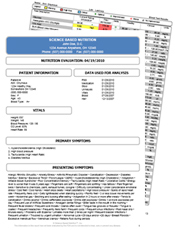It has been long held that in order to lose weight, you must create a calorie deficit. If you cut back 500 calories a day, you should lose about 1lb per week. Also, if you exercise to burn off 500 calories a day you should lose approximately 1lb per week. Do both, you could lose 2lb per week. This is the basic premise behind the “calories in, calories out” mantra. The problem with this way of thinking is that it’s based on the assumption that all calories are burned with 100% efficiency and that the body does not waste energy (calories) no matter what the source.
We consume three types of calories (macronutrients) that can be burned for energy: carbohydrates, proteins, and fats. As most know, you can add your carbohydrates, fat and protein consumed per day to get your total calorie intake for that day. Portion control can be quite time consuming and dictates unrealistic rules which set most people up for failure. In addition, when most people start counting their calories and following a low calorie diet, it slows their metabolism and in addition their protein intake drops too low which increases their susceptibility to infections, joint, bone and muscle disorders.
In order to have successful weight loss, you must understand what your food is made of and how it’s used by the body. Protein can come from plant based sources like beans, seeds, nut, sprouts, and quinoa or it can come from animal based sources like fish, eggs, chicken, turkey and red meats. Carbohydrates are found in breads, potatoes, pasta, rice, fruits and veggies. Fat comes from your cooking oils such as olive oil, canola oil, butter and coconut oil/butter but also comes from avocados, nuts, sees, and meats. For more information about how to choose the best proteins, fats and carbohydrates, please refer to our December 2009 “Eating Clean” newsletter.
Carbohydrate is good for nothing but burning. It’s like gasoline – you can either burn it now or you will store it in your tank to burn later. With carbohydrates, it is a fact that if you consume more than your body can use, your body stores them for later (which contributes to weight gain). When carbohydrates are stored in your liver and muscles, it is called glycogen. When the liver and muscles cells cannot store anymore glycogen, it is turned into fat. When your body needs a quick boost of energy, it converts glycogen into energy. When it needs a prolonged burst of energy, it converts fat to energy.
Protein and fat, however, have many uses in the body in addition to generating energy. Protein is used to build muscle cells, to create and repair cell membranes in all cells, and to create enzymes that make it possible for all your body functions to occur. Fat transports certain nutrients that are not soluble in water, acts as a precursor to a number of hormones, insulates nerve cells to ensure that electrical charges are carried properly, and, like protein, is used to create and repair cell membranes. Furthermore, fat and protein can both be broken down and recombined into whatever form the body needs.
So you might consume muscle protein from a cow, and the body might break it down and rearrange it to make a digestive enzyme, or incorporate it into the membrane of a brain cell, or use it to make hemoglobin. Protein and fat are like wood – you can certainly burn it for energy, but you can also use it to build a house, or grind it up and make paper out of it.
When fats are burned, they produce ketones. Ketones are fat molecules that are incompletely burned. These ketones can be burned for further energy by certain organs or can be excreted through the urine, breath and sweat. In fact, the heart and brain in particular will suck up ketones to use as fuel whenever they are present. But if more ketones are produced than can be used by the body, which is usually when fat is the primary source of calories, then the body excretes them. There is no storage mechanism for excess ketones. It’s like burning wood and tossing out most of the charcoal because there’s no place to keep it – a waste of energy. If you are overweight, wasting energy is exactly what you want to do.
Get your head around these concepts:
- We observe that people who consume fewer calories have an adverse result of a slower metabolism thus burning fewer calories. The theory behind this is the body has a survival mechanism that is trying to conserve energy and therefore prolonging the chances of survival during famine. On the contrary, we also observe that people who consume more calories actually burn more calories (increase their metabolism), but only on low-carbohydrate diets. Remember, carbohydrates are either burn for energy or are stored. The body won’t waste carbohydrates!
- We realize that portion control is an issue for many people. If you feel portion control may be what’s holding back your weight loss, we suggest you do control your carbohydrate intake. Most importantly, cut out the carbohydrates that provide little nutritional value such as white sugar, white flours, donuts, chips, pop, fruit juice, products with high fructose corn syrup. Limit all breads, pastas and rice (even the healthier versions) but do consumer lots of whole fruits and vegetables. Cut out your highly saturated fatty meats such as bacon, sausage and other cured meats.
- We would be remiss, if we did not include exercise in the weight loss equation. While there are many more benefits from exercise than simply weight loss, exercise is not the main topic for this newsletter. For more information on exercise, please refer to our October 2008 “Aerobic Training”, November 2008 “Flexibility” and December 2008 “Strength Training” newsletters.
- What are you made of? Weight scales determine only the total body mass. They do not tell you whether that mass is fat, muscle or water. Body composition is more important than your total weight in determining fitness and health. For more information on body composition, please refer to our February 2010 “Body Composition” newsletter.
- Lose weight in a healthy way by making the necessary lifestyle changes in order to have long term success with weight loss. Set up a consultation with one of our professionals to take the guesswork out of your individual health needs.

